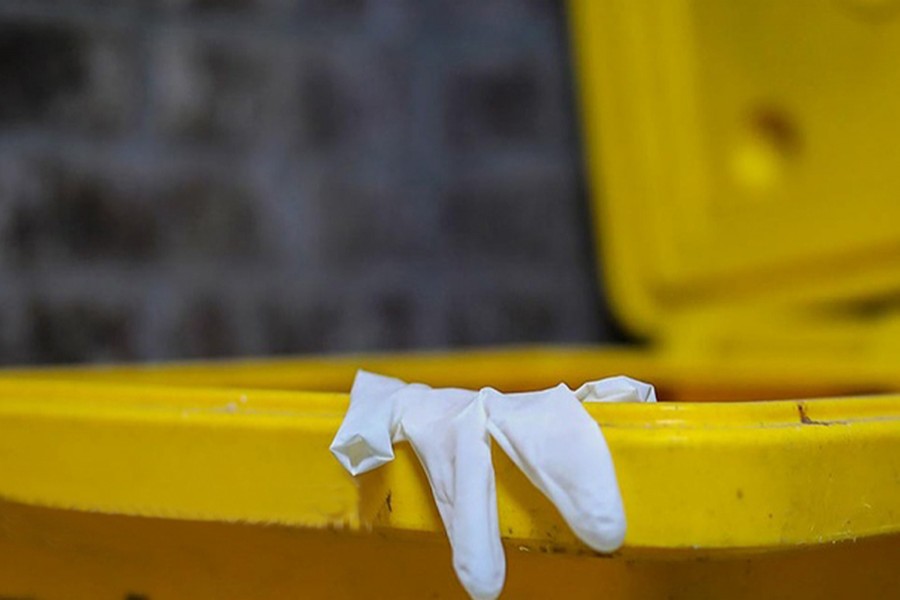
Published :
Updated :

Disposing of potentially infected masks, gloves and other protective gear with household garbage could heighten the risk of aggressive coronavirus transmission in communities, experts say.
They urged civic bodies to collect the personal protective equipment (PPEs) and sanitiser bottles separately to reduce the risk of the infection spreading.
City corporations, for their part, turned their attention to collecting the trash separately almost three months into the outbreak, though it is the waste management at home that remained a worry, reports bdnews24.com.
Around 20,000 COVID-19 cases have been officially confirmed in Dhaka with most of them under care at home, according to Health Directorate data.
On top of the wastes from the infected, citizens are also littering streets and alleyways with plastic gloves, face masks and sanitiser bottles.
A voluntary organisation, Prism Bangladesh, collects these wastes from hospitals, but there is no system in place to collect these risky wastes from homes. As a result, these are getting mixed with household wastes and being sent directly to the city corporation for disposal.
In the first month of the shutdown, 28.2 per cent of the masks, 19.8 per cent of the polythene gloves, 46.3 per cent of surgical gloves and 30 per cent of the sanitiser bottles were found in Dhaka waste disposals, according to a study conducted by Environment and Social Development Organisation (ESDOR).
A total of 447 tonnes of surgical masks, 602 tonnes of polythene gloves, 1,314 tonnes of surgical gloves and 270 tonnes of sanitiser bottles are being produced as wastes every month amid the pandemic outbreak.
The majority of these wastes come from households while face visors, goggles, PPEs and ordinary masks also add to the amount of wastes and they all pose threats.
“As we are not being able to separate these wastes, the risk remains. Some are infected and some are not, but we don’t know the difference. The infected wastes are being discarded with household wastes in houses where infected persons live. This is quite risky,” Shahriar Hossain, general secretary of ESDOR, said.
“If these are not sorted out from ordinary trash, these will contaminate the environment. It also puts the cleaners at risk of infection. We need to separately collect these wastes in sealed containers and bury them at least 10 feet under the ground.”
Shahriar said if these wastes spread in open spaces, drains and rivers, other animals and creatures sharing the ecosystem could become infected which might create a horrible situation. He advised the twin city corporations of Dhaka to take emergency measures to contain the threat.
Public health experts are also wary of this situation.
“If 100 million people dispose of masks or gloves every day, it amounts to 100 million wastes every day. These are not simple trash, these are infected,” said Benazir Ahmed, a former director at the disease control department of the Health Directorate.
“These wastes need to be collected wearing full PPEs like hospital cleaners as we are still not certain how this virus is spreading. We have to count them all as medical wastes and take measures accordingly,” he added.
He suggested collecting these wastes in separate biohazard bags.
These wastes have to be destroyed using special methods - by burning or disinfecting them. The authorities need to appoint public health experts to form prevention teams. They will train these teams on how to do it, he said.
“It’s become a part of our life. It can’t be taken lightly,” he said.
Dhaka City Corporations staff said they were drawing up a strategy for the management of these wastes.
Saidur Rahman, chief waste management officer of Dhaka North City Corporation, said they have sat with Japan International Cooperation Agency or JICA.
“We are planning to collect these wastes separately. We have begun working with JICA on this matter,” he said.
“We can’t really do much about the trash that was thrown away over the last few months. We are making a separate container now and these wastes will be burned separately in dumping stations and landfills.”
But he was quick to add that this operation would take time and people needed to be sensitised about the risks of not dumping the wastes properly.


 For all latest news, follow The Financial Express Google News channel.
For all latest news, follow The Financial Express Google News channel.